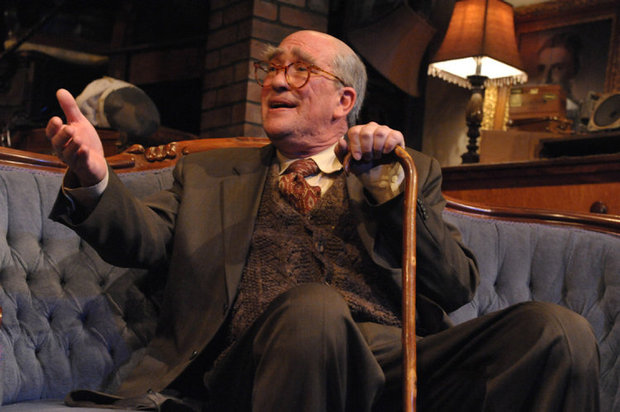

Early fall, 1968, an attic of a decaying NYC brownstone about to succumb to wrecking ball and loaded with dusty, once elegant furnishings, with its fourth wall removed, is the setting for a dramatic experience of classic modern realism.
Typical of Arthur Miller’s dramas, the plot of The Price concerns an American family broken by societal and especially economic forces. Policeman Victor awaits a “second hand” dealer to get a comprehensive price on the belongings of his once-rich parents but mainly the father he supported after his Depression crash. Wife Esther urges Victor to bargain for the best price -- and not to share with his long estranged brother. Walter, a rich doctor, left for school and success, while really smarter Victor took on the stagnant breadwinning role. As Esther exits, she meets dealer Gregory Solomon, “found” by Victor via a phone book.
Solomon hasn’t lost charm despite emptying his once-busy store. He asks about origins, use and present ownership of the furniture. “I pick up the pieces,” he says, when parents die and the people in their family change. “With used furniture, you cannot be emotional.” He shows most of the “stuff is for another age.” After Solomon insists on trust and respect, with business about to be concluded, Walter appears. The second act changes from the first’s emphasis on Solomon and whether the price of the furniture should reflect what was paid for it in terms of Victor’s past. What might be the price demanded of him in the future to resolve his contention with his brother? And to meet his wife’s desire for more money along with a better social position for them?
The bones of contention between brothers become clear in their examination of what price was extracted by their lifetime ambitions, failures and successes in their work, family, and even feelings about themselves. What did their treatment of their father when he failed cost? What price on the brothers’ relationship would be extracted by Victor agreeing to Walter’s idea of using an assessment by Solomon of the furniture for a tax dodge? What price was paid for a secret their father kept, and what could be deduced about their parents‘ relationship? Are there parallels between them and Victor and Esther or Victor and his wife and kids?
In the intrigues unfolded, wise Solomon symbolically advises a “let go” in the conclusion reached. Miller’s drama has shown him getting a new lease on life through taking on the old furniture. Is the price what’s to be paid or what’s been paid for the brothers’ and Esther’s future?
The temptation in most productions is for the memorable character of Solomon to take over. Conrad Feininger certainly holds sway at the start and very end of the play, but director Don Walker has wisely equalized the impact of all the actors. Charlie Kevin’s Victor is clearly the protagonist and appealing. He wins much of the respect that’s talked about as he weighs positions and arguments. Miller’s dialogue for him and Walter is exact and priceless. Peter Thomasson manages to be winning as he reveals Walter’s problems and the reasons for his past action. He has the difficult job of telling a secret that Miller kept too long and without a hint of it, a flaw in the dramatization that Thomasson handles as delicately as possible. The disappointed Esther isn’t always a sympathetic character, but she’s understandable in the context Lauren Wood brings out. She gives the slightest signal that Esther drinks a bit much, yet that’s as significant as the choices of their parents’ possessions that the men want to keep.
Chris McVicker realizes the important set as if presenting another character who owns an abundance of massive possessions. Ross Boehringer’s costumes capture period and characterization, illuminated well by Nick Jones. Just as Miller’s dialogue is so true, so comes a victrola’s recorded Gallagher-and-Shean routine which Edward Cosla arranges as part of his sound design. It’s telling of Conrad Feinninger’s Solomon, a former vaudeville acrobat, to be fascinated with the record -- just one of Miller’s spot-on observations.
